| 2015 | APR | |||||||
| 2014 | JUL | OCT | DEC | |||||
| 2013 | JAN | FEB | APR | MAY | JUN | JUL | AUG | SEP |
| 2012 | SEP | OCT | NOV | DEC |
Why is Okinawa mozuku fucoidan better than fucoidan derived from other sources?
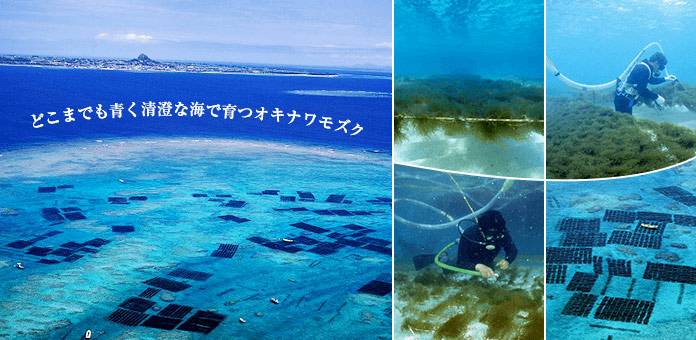
What is fucoidan?
Fucoidan is a macromolecular polysaccharide derived from the slimy part of most brown seaweeds. This substance also belongs to the group of water-soluble dietary fibers. Of all the seaweeds that are currently used to produce commercial fucoidan products, Okinawa mozuku seaweed (Cladosiphon okamuranus) is the undisputed leader in fucoidan content. Okinawa mozuku fucoidan is also the most studied fucoidan, with a proven safety record. Even without scientific proof of the safety of Okinawa fucoidan, the Okinawa people—who enjoy the longest and healthiest life in Japan—are living proof that it is safe to consume. It is no secret that mozuku seaweed forms an integral part of the healthy Okinawan cuisine. 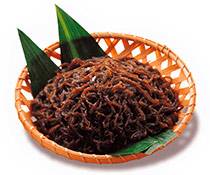
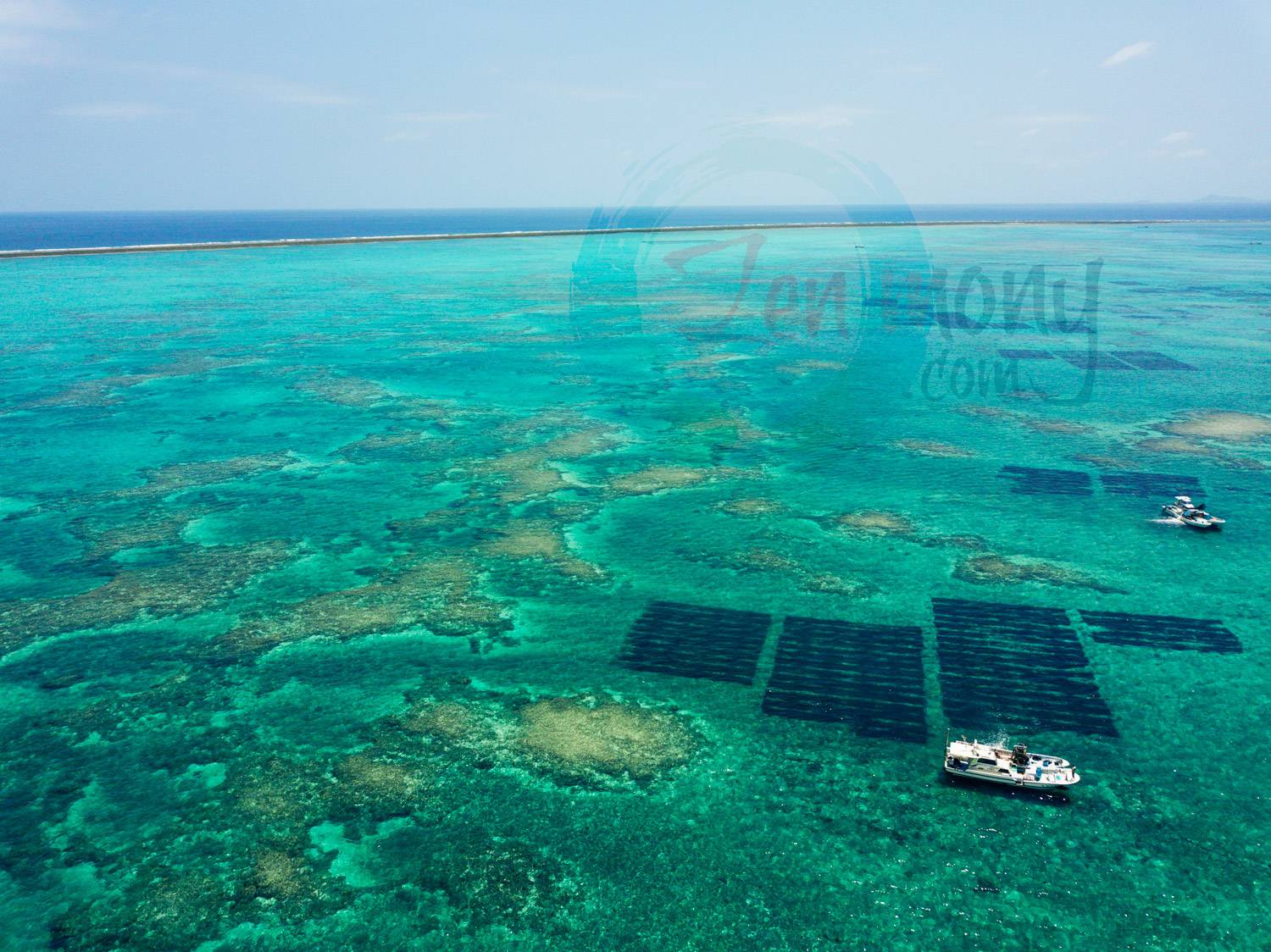 Besides Okinawa mozuku, fucoidan is also found in kombu (Laminaria), wakame (Undaria pinnatifida), hijiki (Hizikia fusiformis) and other seaweeds, but there are several reasons why Okinawa fucoidan is one of the best choices. With other seaweeds, most notably Laminaria japonica, Undaria pinnatifida and Hijikia fusiforme, when trying to extract fucoidan, another polysaccharide known as alginic acid inevitably gets mixed with the fucoidan, making it difficult to further purify the final product.
Besides Okinawa mozuku, fucoidan is also found in kombu (Laminaria), wakame (Undaria pinnatifida), hijiki (Hizikia fusiformis) and other seaweeds, but there are several reasons why Okinawa fucoidan is one of the best choices. With other seaweeds, most notably Laminaria japonica, Undaria pinnatifida and Hijikia fusiforme, when trying to extract fucoidan, another polysaccharide known as alginic acid inevitably gets mixed with the fucoidan, making it difficult to further purify the final product.
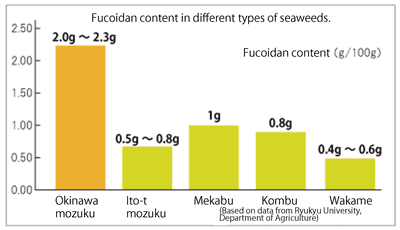 As previously mentioned, Okinawa mozuku is the undisputed champion in fucoidan content and is ideal for fucoidan extraction. Indeed, the polysaccharide content of dry mozuku is almost 90% macromolecular fucoidan, of which 45% is fucose, 26% uronic acid and 19% sulfates (based on the data provided by Kanehide Bio www.kanehide-bio.co.jp/material/jp/fucoidan.html). "Okinawa mozuku" seaweed contains 6–8 times more fucoidan than Laminaria japonica.
As previously mentioned, Okinawa mozuku is the undisputed champion in fucoidan content and is ideal for fucoidan extraction. Indeed, the polysaccharide content of dry mozuku is almost 90% macromolecular fucoidan, of which 45% is fucose, 26% uronic acid and 19% sulfates (based on the data provided by Kanehide Bio www.kanehide-bio.co.jp/material/jp/fucoidan.html). "Okinawa mozuku" seaweed contains 6–8 times more fucoidan than Laminaria japonica.
Below are the results of Okinawa mozuku fucoidan chemical analysis:
|
|
Fucose |
Uronic acid |
Sulfate group |
Molecular weight |
Fucoidan |
|
Measured value |
45.6% |
26.7% |
19.1% |
77.000 |
89.9% |
|
Standard value |
- |
- |
13% and above |
30.000~ |
85% and above |
Another important fact to note here is that mozuku seaweed has the softest tissues of all studied brown seaweeds, which means that its cell walls are also tender and fragile and readily friable, which simplifies the fucoidan extraction process and renders the final product pure and of high quality. The brown seaweed wakame (Undaria pinnatifida)—or more specifically the “mekabu” constituent of wakame—is found in the vast natural habitat that stretches between Korea and the Hokkaido and Kyushu islands of Japan. It is considered the distant second easiest seaweed from which to extract fucoidan. Still, it comes nowhere close to mozuku in terms of quality, ease of extraction, and per gram price of the final fucoidan product.
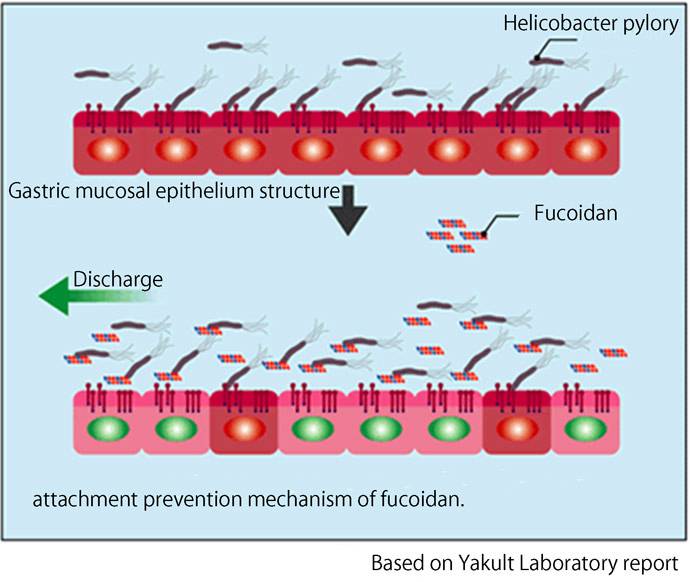
There are several sub-types of mozuku seaweed but "Okinawa mozuku" ("Cladosiphon okamuranus Tokida"), which is also known as "futomozuku" (or "thick mozuku"), has the highest fucoidan content. Okinawa mozuku grows naturally around the Ryukyu archipelago islands and—owing to the plentiful minerals carried by the Kuroshio sea current—it grows 1.5-3.5 mm in diameter thickness.
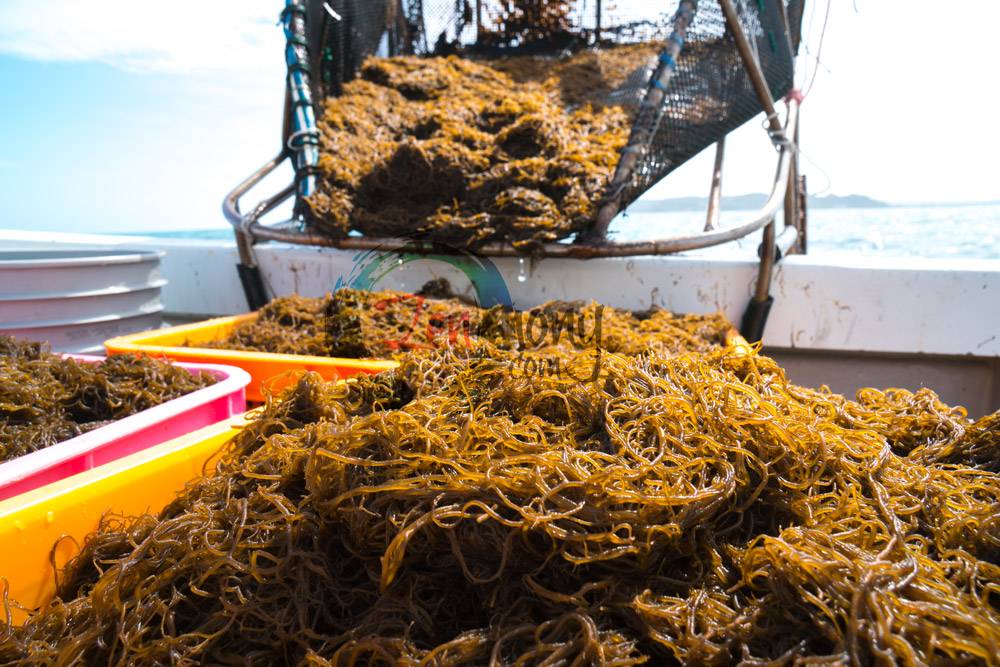 Okinawa fucoidan is manufactured in Okinawa by Kanehide Bio Co., Ltd. using a unique patented (patent number 3408180) fucoidan extraction method that uses organic citric acid (extracted from plums and lemons), which is safe to both humans and the environment compared with hydrochloric acid and acetic acid, which have been used to date.
Okinawa fucoidan is manufactured in Okinawa by Kanehide Bio Co., Ltd. using a unique patented (patent number 3408180) fucoidan extraction method that uses organic citric acid (extracted from plums and lemons), which is safe to both humans and the environment compared with hydrochloric acid and acetic acid, which have been used to date.
What makes Kanehide Bio Co., Ltd. fucoidan stand out? Here are the facts:
-
We use only Okinawa mozuku seaweed, which is widely used in foodstuffs in Okinawa.
-
We make high-quality fucoidan using our unique patented extraction method (patent number 3408180).
-
We do not use any fillers; only 100% pure fucoidan powder is used to make our products.
-
Many studies have concluded that this product is safe for human consumption (third-party certification acquired).
-
Kanehide Bio plants are compliant with the ISO22000 food safety standard and GMP (good manufacturing practice) standard.
Below are the health effects of fucoidan with scientific evidence (for further information, please visit at PubMed (http://www.ncbi.nlm.nih.gov)):
|
Anti-cancer effect |
Fucoidan triggers a selective apoptotic effect (cell destruction) on cancer cells. It also acts as an immunomodulator and helps our immune system to identify “bad” cells more efficiently. |
|
Anti-ulcer effect |
Helicobacter pylori is known to attach itself to any weakened (inflamed) spots on the stomach walls and possibly cause stomach ulcers. Fucoidan prevents Helicobacter pylori from becoming attached to the stomach lining and is also known to heal the weakened spots on the walls of our gastric system. |
|
|
Fucoidan, which is a food fiber, is known to help form feces and so aids with more rapid bowel emptying, thus helping to prevent colon cancer and sustain good health by the elimination of toxins. Fucoidan is also known to improve the digestive system flora by increasing the bacteria that are beneficial to good health. |
|
|
|
|
Prevents arteriosclerosis (hardening of the arteries) |
It has been reported that fucoidan can thin blood and thus help prevent lifestyle-related ailments such as arteriosclerosis. |
|
Cholesterol-lowering effect |
Fucoidan is known to envelop cholesterol molecules and eliminate them from the body. It has also been reported that fucoidan can help increase HDL (high-density lipoprotein) cholesterol ("good cholesterol") and lower the "bad cholesterol" in our blood. |
|
Anti-oxidative effect |
Like vitamin C, fucoidan is an anti-oxidant and defends our bodies from the damage caused by activated oxygen. |
Check out similar products here